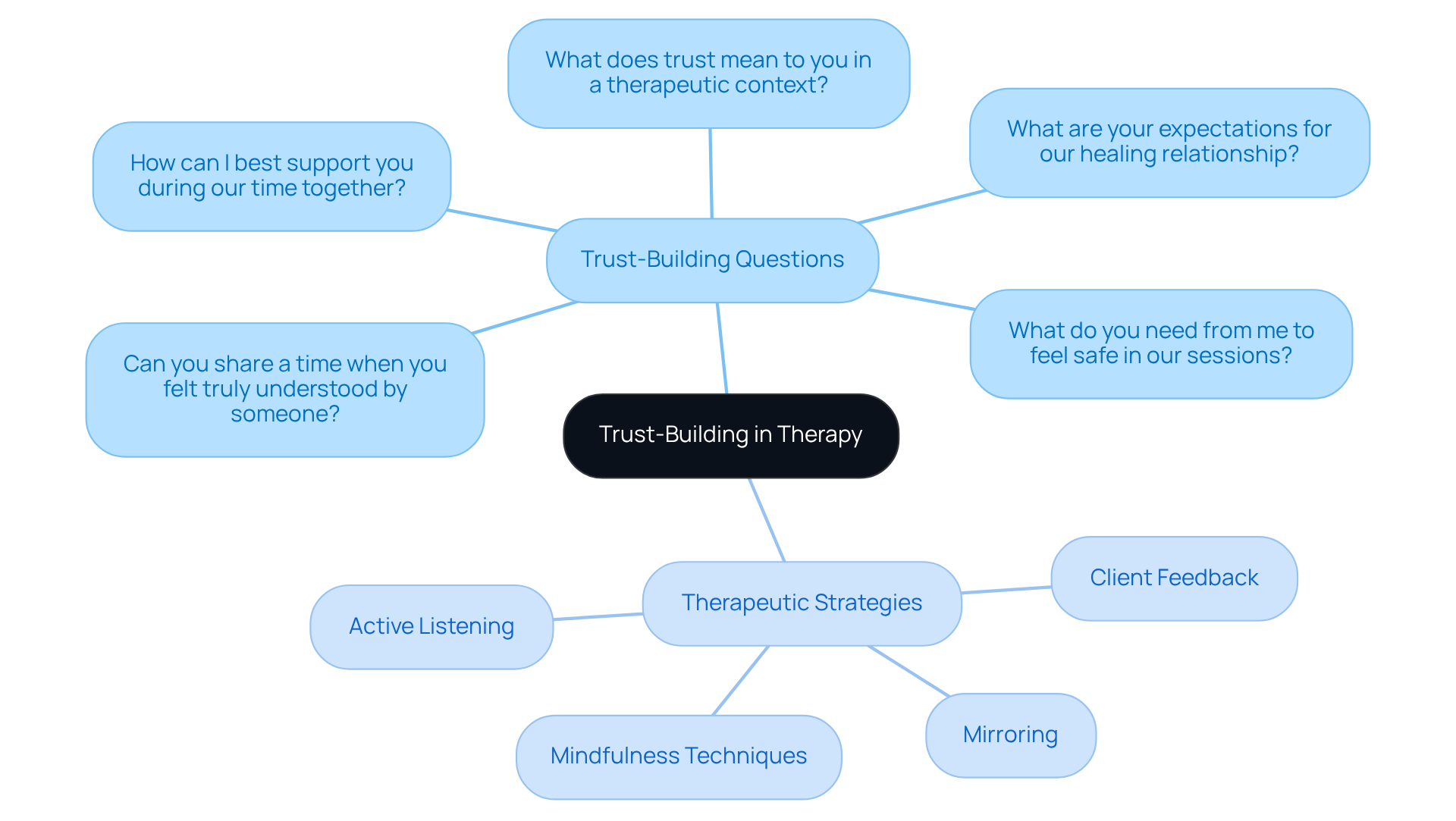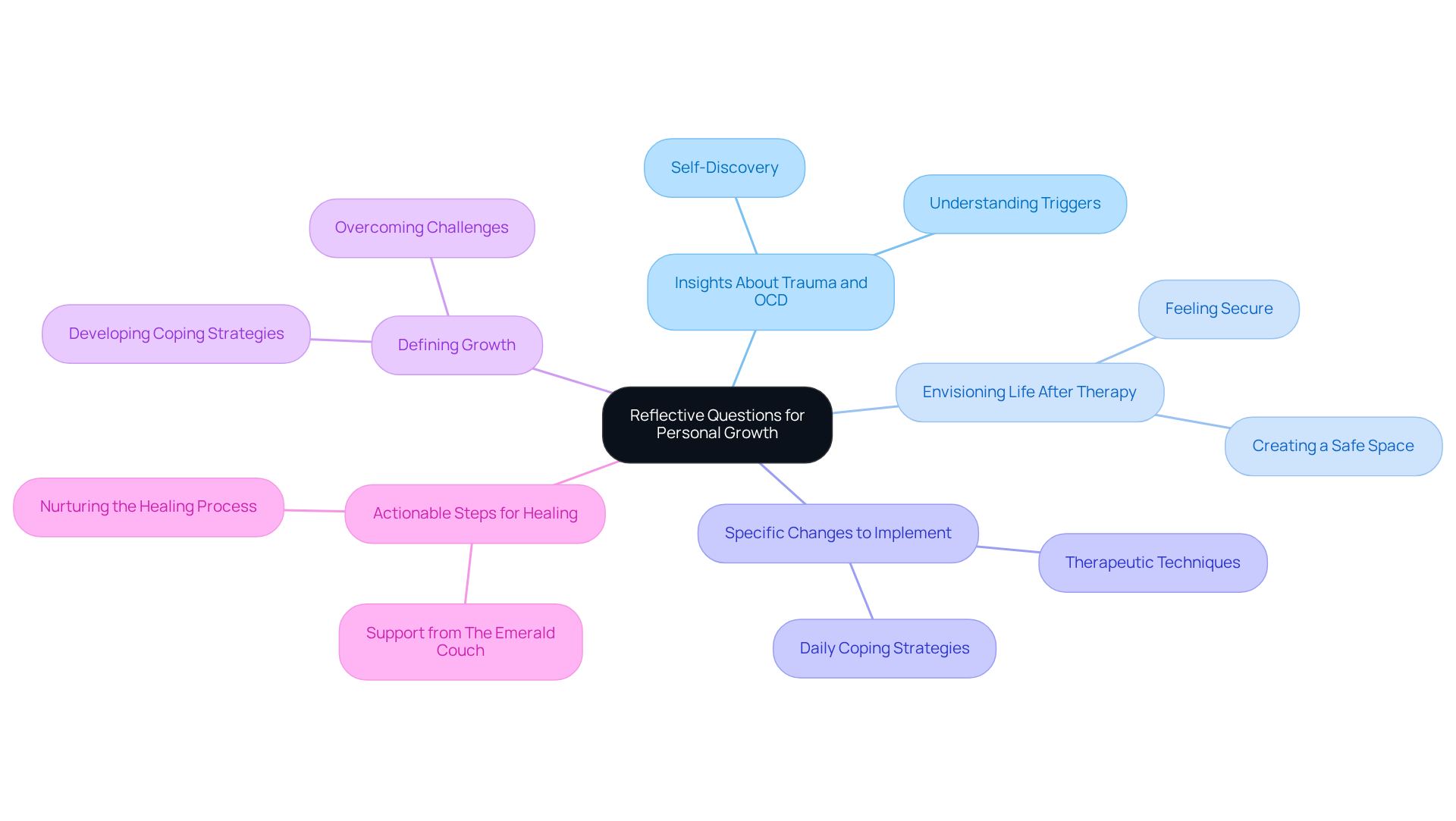Overview
The article "100 Therapy Questions to Enhance Healing and Trust in Therapy" gently highlights how thoughtfully designed questions can facilitate emotional exploration and nurture trust between clients and therapists. By offering a structured approach to discussing trauma and anxiety, these questions not only assist clients in articulating their feelings but also cultivate a safe environment—an essential foundation for effective therapy and personal growth.
Have you ever felt overwhelmed by your past? These questions invite you to reflect on your experiences, fostering a deeper understanding of your emotional landscape. As we explore this further, it's clear that such inquiries play a vital role in creating a nurturing space for healing. Ultimately, seeking therapy can be a powerful step towards personal transformation, allowing you to navigate your feelings with compassion and support.
Introduction
The journey through trauma and anxiety can often feel isolating. Have you ever felt overwhelmed by your past? Yet, the right questions can illuminate the path to healing. The Emerald Couch offers a comprehensive list of 100 therapy questions designed to deepen emotional exploration and foster trust between clients and therapists.
As individuals confront their past and navigate their feelings, they may wonder: how can these thoughtful inquiries transform their therapeutic experience and enhance their emotional well-being? This article delves into the significance of these questions, revealing how they serve as powerful tools for personal growth and recovery in therapy.
Together, let’s explore how these inquiries can guide you towards a brighter, more hopeful future.
The Emerald Couch: 100 Therapy Questions for Trauma and Anxiety Recovery
The Emerald Couch provides a thoughtfully curated selection of 100 therapy questions aimed at enhancing healing and building trust within the counseling relationship. These questions are carefully crafted to help individuals explore their emotional landscapes and understand their trauma, fostering a deeper connection with their therapist. By addressing critical issues related to trauma and anxiety, these inquiries serve as essential tools in the healing process.
Have you ever felt overwhelmed by your past? Research indicates that nearly 50% of individuals diagnosed with depression also experience anxiety disorders, highlighting the interconnectedness of these challenges. The therapeutic questions at The Emerald Couch not only facilitate discussions around these co-occurring conditions but also empower individuals to express their feelings and experiences. This organized conversation is vital, as studies show that a significant portion of individuals report improved emotional health after participating in counseling.
Furthermore, the impact of well-designed inquiry prompts extends beyond mere dialogue; they enrich the healing journey by nurturing trust between individuals and therapists. This trust is crucial for effective treatment, as it creates a to explore their past experiences without fear of judgment. The Emerald Couch's commitment to personalized support ensures that every individual receives the attention necessary for successful healing, underscoring the importance of a supportive and inclusive environment in treatment. Incorporating mindfulness techniques, such as meditation and conscious breathing, alongside these questions can further enhance the therapeutic experience, aiding individuals in managing anxiety and heightening their self-awareness during sessions.
In summary, the 100 therapy questions provided by The Emerald Couch serve as a valuable resource for trauma healing, enabling clients to confront their psychological challenges while fostering resilience and personal growth. This holistic approach to mental health care highlights the practice's dedication to helping individuals reclaim their lives from the burdens of their past, while also showcasing the transformative benefits of mindfulness in therapy.
Exploratory Questions: Unpacking Emotional Experiences in Therapy
- What emotions do you find yourself experiencing most frequently, and how do they show up in your daily life? Understanding your inner landscape is vital for building a trusting at The Emerald Couch.
- Can you share a recent experience that stirred strong emotions within you? Reflecting on these moments can be a valuable step as we collaboratively craft your personalized treatment plan during our intake session.
- How do you usually cope when feelings become overwhelming? Recognizing your coping strategies is essential for assessing your progress and enhancing your ability to manage emotions through mindfulness techniques.
- What past experiences do you feel influence your current mood? Exploring these factors can provide important insights into your triggers and help us work together toward healing.
- How do you communicate your emotions to those around you? Understanding your expression style can enrich the healing process, allowing us to incorporate mindfulness practices that foster self-awareness and personal growth.
These thoughtful 100 therapy questions invite clients to delve into their emotional experiences, offering therapists valuable insights into emotional triggers and coping mechanisms. This approach nurtures a collaborative and mindful therapeutic journey with the use of 100 therapy questions.
Trust-Building Questions: Strengthening the Therapist-Client Relationship
- What do you need from me to feel safe in our sessions?
- How can I best support you during our time together?
- What are your expectations for our healing relationship?
- Can you share a time when you felt truly understood by someone?
- What does trust mean to you in a therapeutic context?
These 100 therapy questions serve as that encourage open dialogue, allowing individuals to express their needs and expectations. Establishing trust is fundamental for effective therapy, and utilizing 100 therapy questions can significantly enhance the therapist-client relationship and emotional outcomes. Mindfulness techniques, including meditation and conscious breathing, can play an essential role in this process by assisting individuals in slowing down and becoming more aware of their thoughts and emotions. This nurturing approach helps cultivate a sense of safety and presence during sessions.
Listening to feedback from clients and affirming their emotions are vital practices that help create a secure healing atmosphere. By encouraging individuals to share their experiences and viewpoints, therapists can foster a cooperative environment that supports healing and personal development. Moreover, incorporating strategies such as active listening and mirroring can further enhance the therapeutic alliance, ensuring that individuals feel acknowledged and understood. Mindfulness can also assist individuals in navigating their emotions, making it easier for them to express their needs and expectations in therapy.

Reflective Questions: Encouraging Personal Growth and Healing
- What insights have you discovered about yourself throughout this journey, particularly regarding your trauma and your experience with OCD?
- How do you envision your life after therapy, especially in terms of feeling secure within your body and home?
- What specific changes do you hope to implement moving forward, guided by these 100 therapy questions, to on your daily life?
- How do you personally define growth when it comes to overcoming trauma and developing effective coping strategies?
- What actionable steps can you take to nurture your healing process, and in what ways can The Emerald Couch support you on this journey?
These reflective inquiries, such as the 100 therapy questions, not only prompt you to evaluate your progress but also encourage you to articulate your aspirations, reinforcing your commitment to personal development and recovery. Research shows that individuals who engage in reflective practices often report a greater sense of progress, deepening their dedication to their therapeutic journey. Experts highlight that such reflection is vital for healing, as it helps you connect your experiences with your growth, leading to transformative outcomes. At The Emerald Couch, we provide personalized mental health support, including a free consultation to tailor therapy to your unique needs, ensuring that your journey is both effective and meaningful.

Conclusion
The therapeutic journey is profoundly enriched by well-crafted questions that encourage healing and foster trust between clients and therapists. The 100 therapy questions presented by The Emerald Couch are thoughtfully designed to guide individuals through their emotional landscapes, empowering them to confront trauma and anxiety with greater clarity and confidence. By creating a safe environment for exploration, these inquiries facilitate deeper understanding and strengthen the therapeutic alliance that is essential for effective treatment.
Throughout this article, we have underscored the significance of these questions, highlighting their role in unpacking emotional experiences, building trust, and promoting personal growth. From exploratory questions that encourage self-reflection to trust-building prompts that enhance the therapist-client relationship, each category serves a unique purpose in the healing process. Incorporating mindfulness techniques further enriches the therapeutic experience, aiding individuals in managing their emotions and fostering resilience.
Ultimately, the journey of healing is a collaborative effort that requires both introspection and open dialogue. Have you ever felt overwhelmed by your past? By embracing the power of these 100 therapy questions, individuals can reclaim their narratives and embark on a transformative path toward recovery. Engaging with these inquiries not only promotes personal development but also reaffirms the importance of trust in therapy, paving the way for a more profound and impactful healing experience.
Frequently Asked Questions
What is The Emerald Couch?
The Emerald Couch is a resource that provides a curated selection of 100 therapy questions designed to enhance healing and build trust within the counseling relationship.
How do the therapy questions help individuals?
The therapy questions help individuals explore their emotional landscapes, understand their trauma, and foster a deeper connection with their therapist, which is essential for the healing process.
What is the relationship between trauma and anxiety?
Research indicates that nearly 50% of individuals diagnosed with depression also experience anxiety disorders, highlighting the interconnectedness of these challenges.
How do the questions facilitate discussions around co-occurring conditions?
The questions empower individuals to express their feelings and experiences, facilitating organized conversations about trauma and anxiety, which can lead to improved emotional health.
Why is trust important in therapy?
Trust is crucial for effective treatment as it creates a safe space for individuals to explore their past experiences without fear of judgment, enhancing the overall therapeutic experience.
How does The Emerald Couch ensure personalized support?
The Emerald Couch emphasizes the importance of a supportive and inclusive environment, ensuring that every individual receives the attention necessary for successful healing.
What techniques can enhance the therapeutic experience alongside the questions?
Incorporating mindfulness techniques, such as meditation and conscious breathing, can further enhance the therapeutic experience by aiding individuals in managing anxiety and heightening their self-awareness during sessions.
What is the overall goal of the therapy questions provided?
The overall goal of the therapy questions is to serve as a valuable resource for trauma healing, enabling clients to confront their psychological challenges while fostering resilience and personal growth.




